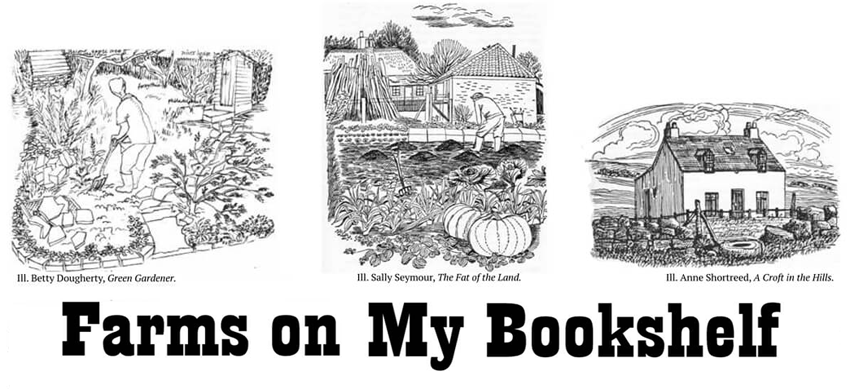What did I say in my first post? That I was not too keen on reading about animals, or reading books by (rich) people with nannies? Hmmm, somehow Phylidda Barstow made the grade anyway. Before nanny appeared I was completely taken in by her first chapter which deals with buying chickens from a poultry farm:
'In each cage, whose sloping floor was no bigger than a sheet of typing paper, were crammed five clucking, cackling, jostling, pellet-picking chickens, their constantly moving heads pale brown, their staring eyes round and mad, and their bodies almost completely naked'.
'Seventy weeks of close confinement had eradicated all normal chicken behaviour.' The chickens cannot even walk. 'By the next morning two had keeled over and lay stiffly, necks extended - killed, I imagine, by the sudden change in conditions - but the others had begin to shuffle around the playpen, hoisting themselves along with their wings, rather like babies just before they can crawl.'
It takes eight weeks for their feathers to start growing again, and it is a long time before they lay eggs again.
In the early '60's Phylidda and her family, plus Nanny, move to the house in the Chilterns, where her husband (Duff) was brought up. It has a garden and a few acres of land. The first chapters deal with their stay there. Later they move to a farm in Gloucestershire, which comes with more land and enables them to keep more animals. The book is mostly about these animals: chickens, dogs, cats, bees, horses, sheep and alpaca's.
One of the lessons Phyllida learns is to leave well alone: be it moving orphaned chicks in with another hen's brood or hand rearing a ram: it seldom ends well.
The chapters about BSE and Foot And Mouth disease are down to earth and moving and really bring home the risks that farmers run, and the awful fate that awaits animals struck by these diseases.
I would urge anyone who is thinking of keeping sheep to read the chapter The Shepherding Year. There is so much that can go wrong, it would put me off forever!
Phyllida writes about the animals they keep, but also about the ones that invite themselves:
'Furred or feathered, with two legs or four, with gossamer wings, or far too many feet, or just a single foot attached to a stomach, 'the frontier tribes' are what I call the unofficial, unauthorised residents of our smallholding'.
We can probably all identify with her feelings on magpies: 'Without wanting to sound too high-flown, I feel that all creation has an equal right to life, and animals cannot be blamed for following the nature they have been allotted - at least I do until the juicy, self-satisfied clucking of a magpie raiding small birds' nests in the garden sends such liberal principles flying out of the window.'
If it isn't magpies, it is woodpigeons raiding fruit bushes and vegetable plots, foxes eating the chickens, moles upsetting the lawn, slugs and snails .... Well, we all know the list goes on. One chapter is written from the viewpoint of these animals.
Phyllida manages to grow most of her own food. Selling has been another matter, because of all the rules involved. Therefore she and het husband have not been tempted to give up the day job, 'and anyway running a smallholding is more a way of life than of making a living, since there is small hope of earning more tham just enough to cover the costs.'





